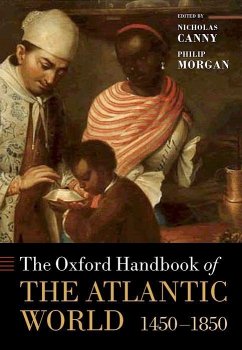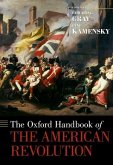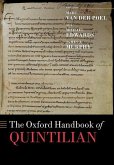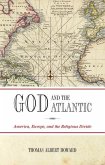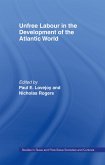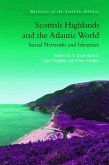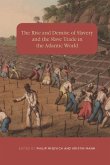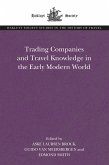Thirty-seven essays providing a comprehensive overview, covering the most essential aspects of Atlantic history from c.1450 to c.1850, offering a wide-ranging and authoritative account of the movement of people, plants, pathogens, products, and cultural practices-to mention some of the key agents--around and within the Atlantic basin.
The essays in this volume provide a comprehensive overview of Atlantic history from c.1450 to c.1850, offering a wide-ranging and authoritative account of the movement of people, plants, pathogens, products, and cultural practices-to mention some of the key agents-around and within the Atlantic basin. As a result of these movements, new peoples, economies, societies, polities, and cultures arose in the lands and islands touched by the Atlantic Ocean, while others were destroyed. The team of scholars in this volume seek to describe, explain, and, occasionally, challenge conventional wisdom concerning these path-breaking developments. They demonstrate connections, explore contrasts, and probe themes. During the four centuries encompassed by this collection, pan-Atlantic webs of association emerged that progressively linked people, objects, and beliefs across and within the region. Events in one corner of the Atlantic world had effects, reverberations thousands of miles away. The great virtue of thinking in Atlantic terms is that it encourages broad perspectives, unexpected comparisons, trans-national orientations, and expanded horizons; the parochialism that characterizes so much history writing and instruction today, as in the past, has a chance of being overcome.
Hinweis: Dieser Artikel kann nur an eine deutsche Lieferadresse ausgeliefert werden.
The essays in this volume provide a comprehensive overview of Atlantic history from c.1450 to c.1850, offering a wide-ranging and authoritative account of the movement of people, plants, pathogens, products, and cultural practices-to mention some of the key agents-around and within the Atlantic basin. As a result of these movements, new peoples, economies, societies, polities, and cultures arose in the lands and islands touched by the Atlantic Ocean, while others were destroyed. The team of scholars in this volume seek to describe, explain, and, occasionally, challenge conventional wisdom concerning these path-breaking developments. They demonstrate connections, explore contrasts, and probe themes. During the four centuries encompassed by this collection, pan-Atlantic webs of association emerged that progressively linked people, objects, and beliefs across and within the region. Events in one corner of the Atlantic world had effects, reverberations thousands of miles away. The great virtue of thinking in Atlantic terms is that it encourages broad perspectives, unexpected comparisons, trans-national orientations, and expanded horizons; the parochialism that characterizes so much history writing and instruction today, as in the past, has a chance of being overcome.
Hinweis: Dieser Artikel kann nur an eine deutsche Lieferadresse ausgeliefert werden.

Die international seit geraumer Zeit boomende "Atlantische Geschichte" stellt den Versuch dar, die Geschichte eines Sets von Gesellschaften zu analysieren, denen gemeinsam war, dass sie sich ohne ihre Einbindung in das sich im fünfzehnten Jahrhundert etablierende transatlantische Netzwerk fundamental anders entwickelt hätten. Seit dieser Zeit überqueren Menschen, Pflanzen, Pathogene, Waren und kulturelle Praktiken regelmäßig den Atlantischen Ozean. Mit der Intensivierung dieser Verbindungen gingen grundlegende Transformationen einher. Neue Gesellschaften, politische Ordnungen, Ökonomien und Kulturen entstanden, andere wurden zerstört. Die Beiträge des Handbuchs der Atlantischen Welt verdeutlichen, wie die Perspektive der Atlantischen Geschichte es binnen einer Historikergeneration möglich gemacht hat, Verknüpfungen ebenso wie Diskontinuitäten deutlicher zu sehen, die zuvor im Rahmen der üblichen National- oder Imperialgeschichte verdeckt geblieben waren. Mehrere Artikel unterstreichen nachdrücklich, dass die Mehrzahl der Menschen, die mit ihren Ideen und Lebensweisen über den Atlantik reisten, bis in das neunzehnte Jahrhundert hinein "unfreiwillige Migranten" waren - Sklaven, die aus Afrika in die Amerikas zwangsverschleppt wurden. Sie waren, schreibt Emma Rothschild im Abschlusskapitel, "die neuesten Amerikaner, mit der kürzesten Lebensdauer; sie hatten jedoch das größte Wissen über und die rezentesten Erinnerungen an Gesellschaften beiderseits des Atlantiks und an den Übergang von der Alten in die Neue Welt". ("The Oxford Handbook of the Atlantic World 1450-1850". Hrsg. von Nicholas Canny und Philip Morgan. Oxford University Press, Oxford 2011. 671 S., geb., Abb., 109,20 [Euro].)
eck
Alle Rechte vorbehalten. © F.A.Z. GmbH, Frankfurt am Main

